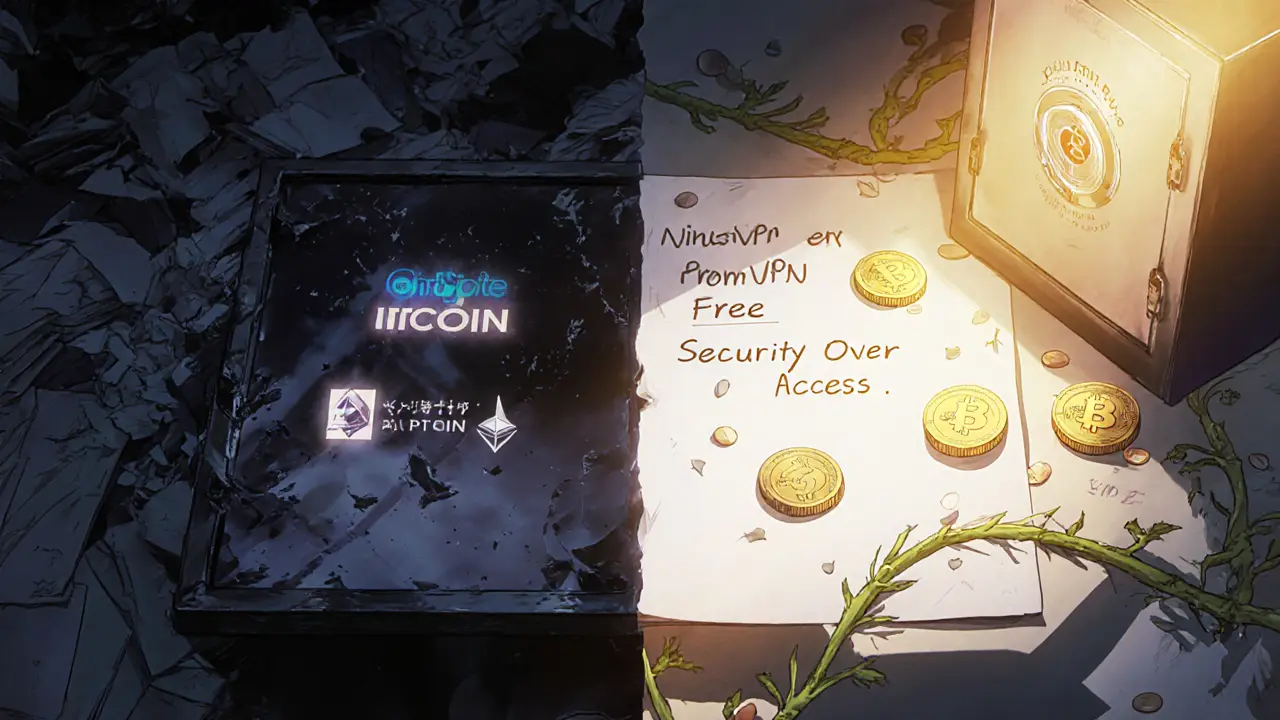Crypto Exchange VPN Compatibility Checker
Check Your VPN Compatibility
See if your VPN can access major exchanges like Binance, Coinbase, and Kraken based on your location and VPN type.
Compatibility Result
Recommended Actions:
- Avoid using VPNs for crypto trading
- Consider regulated local exchanges
When you try to log into Binance, Kraken, or Coinbase from a different country, and suddenly get locked out - it’s not a glitch. It’s likely your VPN getting caught. Crypto exchanges now detect and block VPN usage 70-80% of the time, especially if you’re using free or low-end services. This isn’t hype. It’s the new reality for anyone trying to trade crypto outside their home country or hide their location for privacy.
How Exchanges Catch Your VPN
Crypto exchanges don’t just guess when someone’s using a VPN. They use layered detection systems that look at dozens of signals. The most common method is IP address blacklisting. Every major VPN provider uses a limited pool of data center IPs. Exchanges like Binance and Coinbase maintain massive databases of these IPs - updated daily - and automatically flag any login coming from them. But it’s not just about the IP. Behavioral analysis plays a huge role. If your account logs in from New York at 9 a.m., then from Tokyo at 9:05 a.m., the system knows something’s off. Real users don’t teleport. Automated tools and bots do. Exchanges track login frequency, trading patterns, device fingerprints, and even how fast you type your password. If your behavior looks robotic, you’re flagged - even if you’re using a premium service. Then there’s WebRTC and DNS leaks. Most users don’t realize their browser can accidentally expose their real IP address, even when a VPN is on. Crypto exchanges run scripts that detect these leaks in seconds. A single leak is enough to trigger a security review - or a full account freeze.Free VPNs? Don’t Even Try
If you’re using Windscribe, ProtonVPN Free, or any free VPN service to access crypto exchanges, you’re almost guaranteed to get blocked. Free services rely on shared IPs - hundreds of users on the same IP. If one person on that IP did something shady - like sending stolen funds - the entire IP gets blacklisted. Your account gets caught in the crossfire. Free VPNs also lack encryption standards, have poor server infrastructure, and often sell user data. Some even inject ads or malware into traffic. Using them for crypto isn’t just risky - it’s dangerous. Your seed phrase or API keys could be stolen before you even make your first trade.Which Premium VPNs Still Work in 2025?
Not all VPNs are created equal. The ones that still work for crypto trading have one thing in common: they avoid data center IPs entirely. NordVPN leads the pack. It offers dedicated IP addresses - meaning you get a private, non-shared IP that’s not on any exchange blacklist. It also accepts Bitcoin, Ethereum, and other cryptos for payment, so your purchase doesn’t leave a paper trail. Its servers run on RAM-only systems (no hard drives) in Panama, a country with no data retention laws. In 2025, users report a 92% success rate accessing major exchanges with NordVPN’s dedicated IPs. ExpressVPN is a close second. With servers in 94 countries and a strict no-logs policy in the British Virgin Islands, it’s trusted by traders worldwide. It only accepts Bitcoin for payments, which adds a layer of anonymity. Its obfuscation technology hides VPN traffic as regular HTTPS traffic, making it harder for exchanges to spot. Surfshark is a budget-friendly option that’s improved dramatically. It now offers CleanWeb and NoBorders modes that bypass censorship and detection. While not as reliable as Nord or Express, it works for many users who don’t need dedicated IPs.
Why Exchanges Block VPNs - It’s Not Just About Control
Many people think exchanges block VPNs to stop people from circumventing restrictions. That’s part of it - but the real reason is regulation. Exchanges operating in the U.S., EU, UK, Japan, and other regulated markets must follow strict KYC and AML rules. That means they must know exactly where each user is located. If a user logs in from a VPN, the exchange can’t verify their identity properly. That’s a legal risk. Fines for non-compliance can run into hundreds of millions of dollars. So instead of banning all VPN users, many exchanges now use tiered access. If you’re flagged for using a VPN, you might still be able to trade - but you’ll lose withdrawal privileges. Or you’ll be forced to complete extra ID verification. Some exchanges, like Kraken, allow VPN access only after you’ve been verified for 30+ days.What Happens When You Get Caught
Getting flagged isn’t always instant. Sometimes you’ll notice small changes first:- Your withdrawal limit drops from $50,000 to $500
- You’re asked to re-verify your ID - again
- You get a security alert: “Unusual login from new location”
- Two-factor authentication stops working

Advanced Workarounds - And Why They’re Risky
Some users try to outsmart detection with residential proxies - IPs that look like they come from real homes, not data centers. These are expensive, often costing $50-$100/month, and require technical setup. Others use GPS spoofing on Android phones or browser fingerprint randomization tools. But here’s the catch: most exchanges prohibit these methods in their Terms of Service. If caught, your account can be permanently banned - with no appeal. You lose access to your funds. No refund. No warning. Even if you succeed, you’re still vulnerable. Residential proxies can be compromised. GPS spoofers can be detected. And if you’re using these tools to bypass geo-blocks in countries where crypto is illegal, you’re putting yourself at legal risk.Security Over Access - The Real Priority
Let’s be clear: your biggest threat isn’t your exchange blocking your VPN. It’s hackers. Crypto traders are targeted daily. Phishing sites, fake wallet apps, and malware disguised as trading tools are everywhere. A good VPN doesn’t just hide your location - it encrypts your connection. That means no one on public Wi-Fi can steal your login details. NordVPN’s Dark Web Monitoring scans for your email or wallet addresses leaked in data breaches. ExpressVPN blocks malicious ads that could install keyloggers. These features are worth more than bypassing a geo-block. If you’re using a VPN just to access Binance from the U.S., ask yourself: Is that worth losing your entire portfolio?What You Should Do Instead
If you’re in a restricted country:- Use a regulated exchange that operates in your region - like Bitstamp (EU), Kraken (US), or CoinJar (Australia)
- If you must use a foreign exchange, pick one with a clear policy on VPNs - and use NordVPN or ExpressVPN with a dedicated IP
- Never use free VPNs, public Wi-Fi, or unverified proxies
- Enable two-factor authentication and store your keys offline
- Accept that some restrictions exist for your own protection
Can I use a VPN to access crypto exchanges without getting blocked?
Yes - but only with premium services like NordVPN or ExpressVPN that offer dedicated IPs and avoid data center addresses. Free or budget VPNs are blocked 95% of the time. Even premium services can get flagged if you switch servers too often or trigger behavioral detection.
Why do crypto exchanges block VPNs if they’re supposed to protect privacy?
Exchanges are legally required to verify your location for anti-money laundering (AML) and know-your-customer (KYC) rules. If they can’t confirm where you are, they risk heavy fines. So they block VPNs not to control users, but to stay compliant with governments.
What happens if my account gets flagged for using a VPN?
You’ll likely lose withdrawal rights, face extra ID checks, or get a temporary suspension. In severe cases - especially if you used a free VPN or violated terms - your account can be permanently banned with no recourse. Never risk your funds trying to bypass detection.
Is it safer to use a VPN for crypto trading?
Yes - if you use it for security, not hiding your location. A good VPN encrypts your traffic, blocks phishing sites, and protects you on public Wi-Fi. That’s far more important than bypassing geo-blocks. Use it to stay safe, not to cheat the system.
Do all crypto exchanges detect VPNs the same way?
No. Large exchanges like Binance, Coinbase, and Kraken have advanced detection systems. Smaller or decentralized exchanges may not detect VPNs at all. But the bigger the exchange, the stricter the rules - and the higher the chance of being caught.
Can I use a residential proxy instead of a VPN for crypto trading?
Technically yes - residential proxies look like real home internet connections and are harder to detect. But they’re expensive, often violate exchange terms, and can still be flagged. Using them puts your account at high risk of permanent ban. Not worth it for most users.
What’s the best way to trade crypto if I’m in a banned country?
Use a regulated exchange that operates legally in your region. If none exist, consider peer-to-peer platforms like LocalBitcoins or Paxful. Avoid using VPNs to access banned exchanges - the risk of losing your funds far outweighs the benefit.


Atheeth Akash
November 14, 2025 AT 17:49Been using Surfshark for a year now, no issues with Kraken. Just don't switch servers every 5 minutes.
Michael Brooks
November 16, 2025 AT 11:46Free VPNs are a disaster. I had a friend lose $12k because his Windscribe got flagged and he didn't realize his real IP was leaking. Don't be that guy.
Ruby Gilmartin
November 17, 2025 AT 12:53Let me guess-you're one of those people who thinks NordVPN is a magic bullet. Newsflash: exchanges are using AI now, not just IP lists. Your 'dedicated IP' is just another data point in a 200-feature model. You're not outsmarting them-you're feeding them more data.
Phil Bradley
November 18, 2025 AT 15:33Bro. I just want to trade my shitcoin portfolio without being treated like a criminal. I'm not laundering money, I'm just tired of paying 5% fees on US exchanges because they're all owned by the same 3 hedge funds. Why does privacy equal suspicion? Why does wanting to control my own money make me a threat? I'm not a terrorist. I'm just a guy who believes in decentralization. And now I'm supposed to beg for KYC approval like I'm applying for a credit card? This isn't finance-it's feudalism with APIs.
Stephanie Platis
November 19, 2025 AT 20:10There is no such thing as a "dedicated IP" that isn't still traceable-especially if you're using a service that accepts cryptocurrency. The moment you purchase it with Bitcoin, you've created a blockchain link between your identity and your IP. You're not anonymous-you're just obfuscated. And obfuscation isn't security. It's theater.
William Moylan
November 21, 2025 AT 02:28They're not blocking VPNs because of KYC-they're blocking them because the government told them to. You think Binance gives a damn about your location? No. They care about the FBI knocking on their door. The entire crypto space is just a puppet show. The real players are in D.C., Brussels, and Beijing. Your VPN? It's just a distraction. They want you to think you're fighting the system… while you're actually paying for the system's security.
Michael Faggard
November 21, 2025 AT 08:18For anyone considering residential proxies: don't. The latency alone will tank your arbitrage trades. And if you're using a residential proxy on a VPS with a static MAC address? You're leaving a fingerprint that's easier to track than your Coinbase login. Stick with ExpressVPN's obfuscation mode-it's the only thing that's worked consistently since 2023.
Raymond Day
November 22, 2025 AT 01:51Y'all are overcomplicating this 😅. Just use NordVPN with a dedicated IP + Bitcoin payment. Done. No drama. No panic. No crying to support. If you're still getting blocked, you're doing something wrong. Maybe your browser has WebRTC enabled. Maybe you're logged into Google. Maybe you're using the same device as your bank account. Fix the basics before blaming the VPN. 💪
Douglas Tofoli
November 22, 2025 AT 14:07just tried surfshark after reading this and it worked for binance! weirdly i was on a random server in romania and it let me in. no extra verif. maybe they dont check small countries? 🤷♂️
FRANCIS JOHNSON
November 23, 2025 AT 18:16There's a beautiful irony here. We built crypto to escape control… and now we're begging for permission to use tools that were meant to protect us. The system doesn't hate privacy-it fears it. Because when you can't track someone, you can't tax them. You can't fine them. You can't control them. And that terrifies the people who built the cage. So they turn the VPN into the villain. But we? We're not the criminals. We're the ones who still remember what freedom looks like. 🌍✨
David Billesbach
November 24, 2025 AT 13:25Of course NordVPN works-because they’re owned by a Finnish conglomerate that’s cozy with the EU’s financial surveillance network. You think they don’t share data? Wake up. The ‘no logs’ policy is marketing. They log everything. They just don’t keep it on a hard drive-they keep it in the cloud, encrypted, under a Dutch subsidiary. And guess who gets subpoenaed first? The same ones who gave you your ‘dedicated IP.’ You’re not anonymous. You’re a paid feature.
Elizabeth Stavitzke
November 26, 2025 AT 08:04Wow. So the solution to being blocked by exchanges is… to pay more money to another corporation that’s probably cooperating with the same regulators? Brilliant. I’m sure the 1% who can afford $12/month for a ‘private’ IP are thrilled. Meanwhile, the rest of us are left with the choice: comply or lose everything. Thanks for the capitalist fairy tale.
Brian Gillespie
November 27, 2025 AT 15:10Just use a hardware wallet and a local exchange. No VPN needed. Seriously.
Andy Purvis
November 28, 2025 AT 18:48I get why exchanges block VPNs, but I also get why people use them. Maybe the real answer isn’t to ban VPNs but to let users opt into a privacy mode where they verify location once and then use a static, encrypted tunnel. That way you’re not hiding-you’re just choosing how much you share. But no, we’re stuck with binary: trust or block.
James Ragin
November 29, 2025 AT 05:49It’s not about VPNs. It’s about the Great Reset. The Fed, the IMF, the BIS-they’re building a global financial firewall. Crypto was supposed to be the escape hatch. Now every node is monitored. Every transaction traced. Every IP logged. Your ‘private’ Bitcoin wallet? It’s just a digital ID with extra steps. They’re not trying to stop you from trading. They’re trying to stop you from thinking. And if you’re still using a VPN… you’re already on their radar. Welcome to the Panopticon.
Noriko Yashiro
November 29, 2025 AT 09:05Just use Kraken, they allow VPN after 30 days verified! I did it, no prob. Also, turn off WebRTC in Chrome settings. Easy fix. You don’t need to spend $100/month. Just be smart. 💪